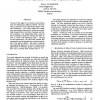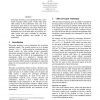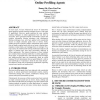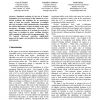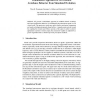106
click to vote
AROBOTS
1999
15 years 1 months ago
1999
We present a framework for constructing representations of space in an autonomous agent which does not obtain any direct information about its location. Instead the algorithm relie...
131
click to vote
JIRS
2000
15 years 1 months ago
2000
Agents (hardware or software) that act autonomously in an environment have to be able to integrate three basic behaviors: planning, execution, and learning. This integration is man...
108
click to vote
SCAI
1993
15 years 3 months ago
1993
In this paper the problems of organization and representation of concept knowledge are addressed from an autonomous agent perspective. The first part of the paper discusses the qu...
137
click to vote
AAAI
1994
15 years 3 months ago
1994
To navigate effectively, an autonomous agent must be able to quickly and accurately determine its current location. Given an initial estimate of its position (perhaps based on dea...
IJCAI
2003
15 years 3 months ago
2003
The aim of this paper is to provide a sound framework for addressing a difficult problem: the automatic construction of an autonomous agent's modular architecture. We briefly...
128
Voted
FLAIRS
2004
15 years 3 months ago
2004
This paper describes a novel architecture for a casebased reasoning (CBR) system. Unlike other agent CBR systems in this architecture every case is an autonomous agent with its ow...
119
click to vote
AAAI
2004
15 years 3 months ago
2004
In recent years, we have witnessed the success of autonomous agents applying machine learning techniques across a wide range of applications. However, agents applying the same mac...
128
click to vote
IFIP12
2008
15 years 3 months ago
2008
Believability of computerised agents is a growing area of research. This paper is focused on one aspect of believability - believable movements of avatars in normative 3D Virtual W...
130
click to vote
CEC
2005
IEEE
15 years 4 months ago
2005
IEEE
Simulated evolution by the use of Genetic Algorithms (GA) is presented as the solution to a twofaceted problem: the challenge for an autonomous agent to learn the reactive componen...
121
click to vote
ICANN
1997
Springer
15 years 6 months ago
1997
Springer
We present a minimalistic approach to establish obstacle avoidance and course stabilization behavior of a simulated flying autonomous agent in a 3D virtual world. The agent uses v...

